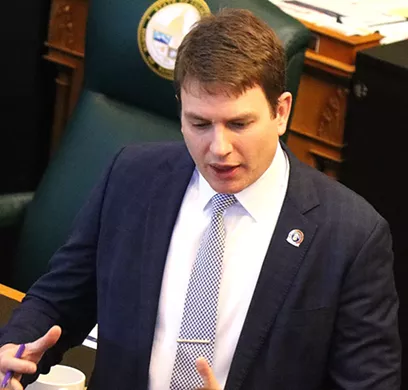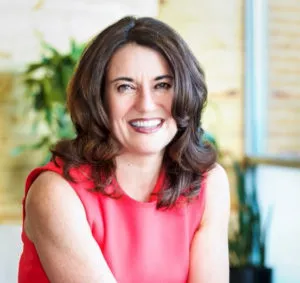The non-partisan election will come at a crucial time for Denver, as the city continues to grapple with the issues of homelessness, a lack of affordable housing, a tangled public transportation system and crime. The next mayor will also have to deal with the ramifications of the pandemic, particularly on downtown, where the number of office workers continues to be low, affecting restaurants, bars and other businesses.
The last time Denver saw a wide-open mayor’s race was in 2011, after John Hickenlooper left city hall before the end of his second term for a move to the governor’s office. That year, there were eleven candidates — including Hancock, then the president of Denver City Council.
So far, the only people to officially declare for the 2023 Denver mayoral campaign are perennial political candidate Marcus Giavanni and frequent Denver City Council public commenter Jesse Parris. But a search of reserved domain names hints at some of those who are seriously considering a run.
Leslie Herod
State representive Leslie Herod, a Democrat who helped secure the passage of SB-217, a landmark police-accountability bill, in the aftermath of the George Floyd protests, is frequently mentioned as a mayoral candidate. If she does run, Herod, a member of the LGBTQ Caucus and the chair of the Colorado Black Caucus, can point to her work campaigning for Caring 4 Denver, a sales tax increase that Denver voters approved in 2018 that has sent money to help fund Denver’s co-responder program that pairs Denver cops with mental clinicians.
Herod has two domains registered in her name: lesliefordenver.com and herodfordenver.com.
But Herod won’t commit to a candidacy just yet. “I’m focused on the legislative session right now and fighting for affordable housing, mental health and substance abuse support, and our small businesses,” she says. “There’s more to be done to make Denver a great city for all, and we’ll continue these conversations after May.”
Chris Hansen
A state senator, Chris Hansen currently serves in powerful roles as the chair of the Senate Appropriations Committee and vice-chair of the Joint Budget Committee. The Democrat was first elected to the Colorado House in 2016, then moved to the Colorado Senate in 2020.
Hansen is well-educated, having attended both MIT and the University of Oxford. According to his state Senate campaign website, Hansen “specializes in energy sector economics and data analytics, with 20 years of experience in the global energy industry.”
And hansenfordenver.com has been claimed as a domain since September 2021.
“Yes, I am considering a run for mayor,” Hansen says.

Democratic House Speaker Alec Garnett has served in House leadership roles in recent years.
Jeffrey Beall/Wikipedia CC
Alec Garnett
Like his two colleagues in the Colorado Legislature who are considering mayoral runs, House Speaker Alec Garnett has been a heavyweight in state politics in recent years, helping pass major legislation, including the bill that paved the way for Colorado voters to legalize sports betting in the November 2019 election.
The domain name garnettfordenver.com was claimed in September 2021. Like Herod, Democrat Garnett asserts that he’s focused on the current legislative session, which will be his last, since he is term-limited. “A lot of people have talked to me about it. Obviously, it’s something that I have thought about,” Garnett says. “Denver is going to need a really hands-on, problem-solving operator to get the city back on track.”
Garnett adds that before he’ll make a decision on a run, he’ll need to weigh whether he can be the father he wants to be for his kids as well as mayor.
Alex Valdez
A renewable energy entrepreneur, Alex Valdez was elected to the Colorado House in 2018 and currently serves as the chair of the House Energy and Environment Committee. Valdez is also a co-chair of the Colorado Latino Caucus and has served as the chair of the Colorado LGBTQ Caucus. One of the bills he’s pushing at the Colorado Legislature this session is House Bill 1116, which would create a panel to study natural psychedelics and their use for mental health issues — a fitting move by a Democrat from Denver, the first American city to decriminalize psychedelic mushrooms.
The web domain valdezfordenver.com has been claimed since 2015 and was renewed in November 2021. “I believe Denver is ready for a new vision. I love this city, and I’m absolutely considering stepping up,” Valdez says about his possible mayoral candidacy.

Kelly Brough served for twelve years as the head of the Denver Metro Chamber of Commerce.
MSU Denver
Kelly Brough
Now a chief strategy officer at Metropolitan State University, Brough has been rumored to be interested in a mayoral run for years. She served for twelve years as the president and CEO of the Denver Metro Chamber of Commerce; before that, she held numerous positions in Hickenlooper’s mayoral administration, including chief of staff.
Both kellyfordenver.com and broughfordenver.com are reserved as domains online. Brough did not respond to an email request for comment.
Other Possible Candidates
Other potential candidates include Lisa Calderón, former mayoral candidate and executive director of Emerge Colorado, who says she’s “still considering my options.” The names of current councilmembers Robin Kniech and Chris Herndon, both of whom are term-limited, have also come up; neither returned requests for comment.
What to Expect
Although Denver’s municipal election is set for April 4, 2023 — in November, the city’s voters approved moving it a month earlier from the traditional May date, in order to align with state and federal requirements — several races are certain to continue into the June 6 runoffs. If no one gets more than 50 percent of the vote for a specific office, the two top vote-getters move into that contest. And being the top vote-getter in the first round is no guarantee of victory; Hancock came in second to Chris Romer in the initial vote but won in the runoff.
The next municipal election will also be the first one involving the Fair Elections Fund, thanks to a ballot measure overwhelmingly approved by Denver voters in 2018. For candidates who choose to participate in the program — and agree to lower contribution limits and accepting donations only from individuals and small donor committees — the Fair Elections Fund will match donations from $5 up to $50 at a ratio of nine to one.
The fund will have up to $8 million for this election cycle, but with a mayoral candidate able to get up to $750,000 each, that money could go fast if as many people jump into the race as did in 2011. And from this sneak peek, it looks like there will be no shortage of candidates.








